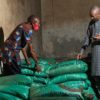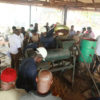PALM OIL VALUE CHAIN PROJECT
PROJECT OVERVIEW:
OUR AIM:
To assist the smallholder palm oil farmers and processors in the sector to increase the quantity and quality of their palm oil outputs and increase their sales to earn more income and create new jobs.
OUR APPROACH:
Confronted with the problem of poor agronomic practices and inefficient traditional methods of production and processing, PIND inspired input companies, lead farmers, agro-dealers and fabricators to help palm oil farmers and processors in the sector to:
- Learn and adopt best management practices to improve oil palm yield
- Produce premium quality oil using improved processing technology
- Access improved harvesting technology to reduce harvesting time and loss of fresh fruit bunches
- Learn about and access new improved seedlings to propagate new plantation
- Learn business skills and use it to access finance for working capital and purchase of equipment
- Develop linkages between processors using the improved small scale processing equipment (SSPE) and secondary processors
SUCCESS STORIES
Akandu Godwin from Port-Harcourt, Rivers State
“I am Akandu Godwin from Port-Harcourt, Rivers State. I deal on agro-input, mostly fertilizer and agrochemicals. I received some orientation and training from PIND (on palm oil best management practices) in 2018—2019 and started officially partnering with them. Since I met with PIND in the first place, they broadened my knowledge. They added value to my business, so it’s not just to tell a customer, “please buy fertilizer.” Now, I can tell them the right fertilizer to buy and the method of application, and those things have increased my output. In fact, it is affecting my business positively because I am selling more product (agro-inputs) now. I am more widely known than before. And why? I am visiting communities, rural areas, all nook and crannies of Rivers State, training and advocating (for best management practices and improved seedlings to palm oil farmers). As you are training, you are as well introducing your products, telling them where your warehouse is and all the rest. Since I started with PIND, I have opened four (4) more centers in various locations. My knowledge is spreading. I have gotten more customers all over the place because I am reaching them out there, going from communities to communities. When you ask of agro-dealers, I think I am the number one (1) in Rivers State”.
Mr Osadolor Ighirae
“We started adopting the best management practices in 2018 when a team from PIND introduced it to us. As soon as we now went into pruning and the best management practices, we were having more yield. This period, we have about 250 liters per week because I have more bunches where before it wasn’t up to 50 liters. There is increase in production, so the staff strength increased so as to be able to cover the entire farm. In 2018, I had just five (5) workers, in 2019 seven (7) workers and in early 2020 now, I have fifteen (15) workers.”
Bobade Adebayo
“We have used some portion of the farm to demonstrate the Best Management Practices (BMP) training and the yield on that farm is more than the one where we did not adopt the BMP practice. … … Our revenue has more than doubled and we now have the capacity to employ more people because of the increase in production….before I do around 100 jerry cans but now I am doing double of that and this is just early in the season which I know I can still do more…I was just struggling to pay for five workers then but now I have about 12 to 15 people working.”






Please do you have upcoming projects like these in the months ahead? If yes how can oil palm farmers in Eket be part of this?